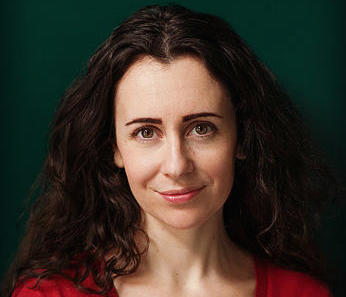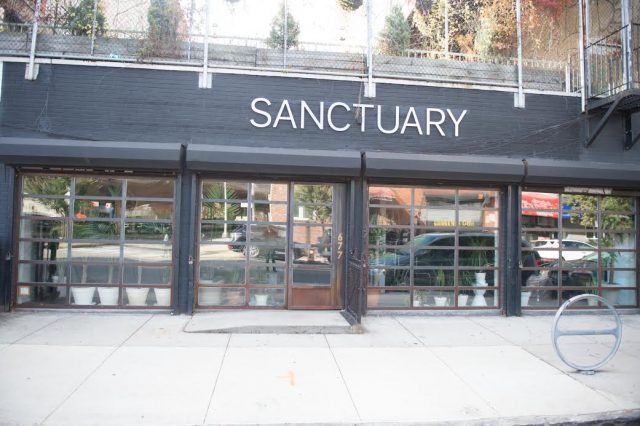
Una LaMarche hasn’t just powered through the face-palming, unibrowed crucible of adolescence and the sloppiness of rookie adulthood–she’s published the tale. Last week, LaMarche released Unabrow: Misadventures of a Late Bloomer, a collection of personal essays on lessons learned from the self-proclaimed awkwardness veteran. She has written for the New York Observer and last July released her second young adult novel, Like No Other, which follows the high school romance between a black teen and Hasidic Jewish girl. LaMarche spoke with us about getting her dream book published, subtle purse vomiting, and her personal growth as translated to the Kate Hudson spectrum.
You released Unabrow and Like No Other within a year, which is pretty impressive to say the least. Did the two projects evolve together, or were their different genres and styles distinct enough to think of them separately?
“Unabrow and Like No Other were totally separate projects that happened to come about around the same time. I love being able to write both YA [young adult] fiction and comic nonfiction, because they work completely different creative muscles, but I was never writing them simultaneously—I think I handed in a final draft of Like No Other in August of 2013 and started writing Unabrow in September. You know, just a really natural progression from a dramatic interfaith, interracial teen romance to essays about interviewing Kevin Bacon, or vomiting into my purse on the subway.”
Are the cringe-worthy lessons from adolescence something that has made you gravitate toward writing for young adults?
“I never actually planned to write YA fiction; it kind of just happened. But I keep my cringe-worthy feelings from adolescence (and, oh, every other period of my life) pretty close to the surface, so I’m sure it’s no coincidence that I gravitate towards writing teenage characters. And writing about my own adolescent experience in Unabrow made me realize how connected I still feel, at 35, to the person I was at 15. So I guess I have some arrested development issues I should probably work out with a therapist.”
As a journalist, how have you found going from covering news and trends to writing about motherhood to crafting a memoir?
“I am always flattered when people refer to me as a journalist, as it’s a word I only apply to myself in quotations. I think of myself as a journalist only in the way that Kate Hudson was a journalist in How To Lose A Guy in 10 Days. I worked for some great media companies, but I was never a real reporter, and I would always rather give my opinion on something than cover the news. So honestly, it’s been a dream come true to throw any shred of journalistic integrity out the window and just say what I think. It feels like I’ve taken a step towards Almost Famous on the Kate Hudson spectrum, only with slightly less mental illness.”
You have described Unabrow as a something you’ve dreamed about since 1997. How did it go from being a 90s dream to a real live book?
When I was seventeen or so, I started reading David Sedaris, Fran Lebowitz, and Nora Ephron, and decided that writing funny, nonfiction essays was what I wanted to do with my life. But I didn’t know how, and didn’t have much life experience to draw from, so I didn’t act on it. Instead, I went to college, majored in film, learned how to drink vodka from an ice luge, etc. When I was in my early twenties I started writing bits and pieces of comic essays (some of which survived to the publication of Unabrow) but then I’d get distracted by The Bachelorette, or set the toaster on fire trying to make a pizza bagel, and I’d put them aside.
In 2006, I started a blog in an attempt to force myself to write more often, and it worked. I wrote a lot, about all kinds of random things that either happened to me or caught my attention, but I didn’t do anything with it. It did, however, get some exposure, and it even helped get me the job as the managing editor at The New York Observer, in 2010. But I still wasn’t writing professionally, aside from occasional bylines at the magazines and newspapers I worked for. I sent a few essays to a few literary agents around that time, and they very kindly told me that essays by unknown authors were a hard sell.
Was there a turning point? How did you get those agents to realize what they were missing?
Fast-forward to early 2012. I had a relatively newborn baby and had left my job to freelance and stay home with him. I was floundering creatively and financially, and as a result was much more open to taking risks (this was just about the same time I wrote my first YA novel, Five Summers), so when I saw a post online about auditions for a national live reading series called Listen To Your Mother, I decided to go for it. I wrote a short, three-minute piece about all the mistakes I’d made that I hoped my son wouldn’t repeat, performed it for the director and producer, and got cast. In May, I performed it again at the JCC in Manhattan. The very next day, I got an email from a literary agent who had been in the audience, asking if she could take me out for coffee and “convince” me to write a book.
For a few hours, I thought I had gone insane and manifested that email, or written it to myself in a drunken stupor. But she was real, and is real, and became my incredible agent. The whole “luck is opportunity meets preparation” thing is pretty true: I hadn’t gotten very far with the essays, but the book I wanted to write was very clear in my mind, so when I met my agent, Brettne, we hit the ground running. She gets all the credit for taking Unabrow from dream to reality, and for getting it sold to the perfect publishing house. The entire team at Plume, especially my editor, Becky, made the book everything I ever hoped it could be. I kind of can’t believe it happened as quickly and fortuitously as it did. I’m still in shock.
That’s a pretty amazing story. What advice do you have for people who are trying to get published but, like you before 2012, just haven’t had the right exposure?
I’d say keep writing, keep polishing, and–most importantly–don’t be afraid to put yourself out there. Submit to journals and quarterlies and magazines and websites; query agents and network with other writers. By the way, I’m a huge hypocrite asshole because I did none of that stuff. It took me losing the security of a steady paycheck and a good night’s sleep to finally take the leap. But–and I’m gonna channel Bill Murray at the end of Scrooged here, get ready–I believe it can happen for you! The miracle of being published can happen! I truly think that just screwing up your courage and going for it is half the battle. (The other half is at least a modicum of talent and the ability to pay your electric bill often enough that they don’t shut it off.)
Leave a Reply



